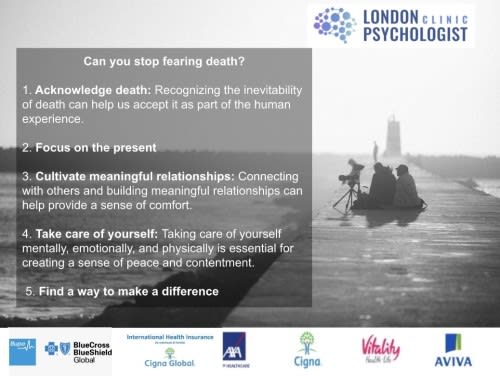What is Death Anxiety?

posted 28th February 2023
What is Fear of Death or Death Anxiety?
A fear of death or death anxiety is a fear or anxiety surrounding the concept of death or mortality. It is a normal fear for many people and can manifest as difficulty processing the death of loved ones, worrying about the process of dying, or a fear of death itself. It is often related to fear of the unknown and not existing anymore. Still, it can also be related to other fears and beliefs, such as fear of pain or suffering in the afterlife or fear of being judged and punished after death.
How do you develop death anxiety and what are the symptoms causes and cure?
Death anxiety can be developed due to a traumatic experience related to death, such as the death of a loved one. It can also be the result of worrying about one's own mortality. Symptoms of death anxiety include fear of death, intrusive thoughts about death, and avoidance of activities or conversations related to death. Severe death anxiety is an intense and excessive fear of one's own death or the death of a loved one. It is marked by intense physical and psychological symptoms, such as panic attacks, difficulty breathing, and a feeling of impending doom. It can lead to isolation, depression, and other mental health issues.
Case Study
Jane is a 46-year-old woman who has been struggling with death anxiety for the past few years. She found it difficult to cope when her father passed away two years ago, and since then she has been struggling with intrusive thoughts about death and worrying about dying. She avoids conversations about death and avoids attending funerals, and she has been seeking help from a therapist to help her overcome her anxiety. Jane ruminates on thoughts such as: What will happen to me after I die? Is there an afterlife? How will my death impact my family and friends? What will happen to my possessions when I die? Will I be remembered after I die? What does it mean to die? Rumination is repetitive thoughts in this case Jane fixates on death, she is also having intrusive thoughts about her own mortality, such as worrying about what will happen when she dies or if her death will be sudden or painful. She also has thoughts about the deaths of those she loves, such as worrying that she won't be able to protect them or that she will lose them suddenly.
Treatments for death anxiety include cognitive behavioral therapy, exposure therapy, and medication
Cognitive Behavioral Therapy (CBT) is a type of therapy that focuses on identifying, challenging, and changing negative thoughts and behaviors. CBT can help Jane identify her negative and anxious thoughts, examine the evidence for and against them, and identify the underlying triggers of her anxiety.
Exposure therapy is a type of therapy that involves exposing oneself to the things they fear in a safe and controlled environment. This can help Jane to learn to cope with her fears and to learn to manage her anxiety.
Medication is another option to help reduce the symptoms of death anxiety. The most common medications used to treat anxiety are antidepressants, anti-anxiety medications, and benzodiazepines. These medications can help to reduce the physical symptoms of anxiety, such as heart palpitations and difficulty breathing, as well as reduce the intensity of Jane’s intrusive thoughts.
Don't most people have a fear of death?
Yes, it is normal to have a fear of death. It is a natural part of the human experience to have a fear of mortality and the unknown. It is important to remember that it is normal to experience this fear and to take steps to manage and cope with it. Death anxiety is a common experience, but severe death anxiety is less common. Estimates of its prevalence vary, but some studies suggest that as many as 10-25 percent of adults experience some degree of severe death anxiety.
Existentialists view death anxiety as a natural part of life that can be addressed by facing and accepting it. They believe that understanding and accepting our mortality can lead to a more meaningful life. Instead of denying death, they encourage people to embrace it as part of the human experience. Existentialists suggest that recognizing our mortality and focusing on living a meaningful life can lead to greater happiness and fulfillment.
Can you stop fearing death?
1. Acknowledge death: Recognizing the inevitability of death can help us accept it as part of the human experience.
2. Focus on the present: Instead of worrying about the future, focus on living your best life in the present.
3. Cultivate meaningful relationships: Connecting with others and building meaningful relationships can help provide a sense of comfort and peace.
4. Take care of yourself: Taking care of yourself mentally, emotionally, and physically is essential for creating a sense of peace and contentment.
5. Find a way to make a difference: Doing something that has a positive impact on the world can help us feel better about our mortality
When a fear of death or death anxiety begins interfering with a person's daily life, it can become abnormal. If a person's fear or anxiety is preventing them from living life or engaging in activities, it may be time to seek professional help.



